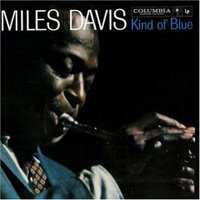Mercy, Mercy, Mercy - Cannonball Adderley

There was a time in my card-carrying free-jazz crusader days when I'd have all but turned up my nose at Mercy, Mercy, Mercy. Woulda been my loss. A few choruses into Fun (after a cleverly modulated Bird paraphrase) and Cannonball Adderley is screaming with the rawness of Trane, Shepp or Pharoah. Before going over the top and launching into the realm of Interstellar Space that Trane et al were approaching at this time, Cannonball hands it off to brother Nat, who follows with an energetic, albeit somewhat less inspiring solo. Somewhat unfortunately, as with much of this album, Zawinal follows with what is a comparatively lackluster solo.
Games picks up the pace again, with Cannonball's solo heating up to a nice boil over a rhythm section that builds up to a funky back beat and alternatively backs down to more of a percolating groove. Cannonball makes the most of this rise and fall, driving it with his solo. After this, Nat's solo - although a bit stronger than on Fun - comes off more as riding the fluctuations in the groove, more than pushing them. Zawinal too is sounding warmed up here, but still not up to par with Cannonball.
Joe's contribution of the title track overshadows any gripes one could have with his playing (he is up against a pretty heavy hitter in Cannonball, anyhow - I sure wouldn't want to follow a Cannonball< solo). His entrance on the electric piano - and the whole solo that follows - is classic: cliches and all, it's perfectly appropriate for the laid-back, funky vibe of the tune. His relatively understated solo keeps this flavor, with some nice energy building up without overdoing it, or over stretching it's bounds.
Sticks contains some of the raunchiest, baddest Cannonball playing on this record. From his deliberately stuttering ascending opening line, you can tell he's going to bring it on in his solo. Bring it he does with some wailing harmonics and searing Parker-esque runs - all in a masterfully constructed succinct solo that says all that needs to be said on the topic. Some serious funk ladled on some simmering gut-bucket laced with a dash of bop - something that pulls together flavors from Shepp to Maceo.
Hippodelphia seems somewhat incongruous in context with the rest of this album - it's more of the standard issue 60s "progressive hard bop" type date (or whatever you want to call it). Sack O' Woe returns more to the feel of the rest of the date, Cannonball< wailing over a back beat more like the earlier tracks. Nat's solo has a good dose of the kinda of bravura playing heard elsewhere on this record - and some enthusiastic hand-clapping from the well-lubricated crowd helps things cook along nicely during by Zawinal and bassist Victor Gaskin. Overall, though, this piece doesn't quite achieve liftoff as well as the first few numbers - it sounds like the set it drawing to a close, but I suppose that's on target with a studio recording designed to simulate a live date.
Mercy, Mercy, Mercy: Live at "The Club" (Capitol ST 2663)
"The Club", Chicago, IL
July, 1966



